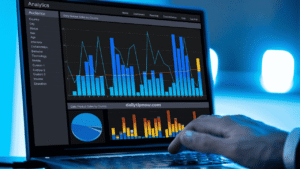Top Business Trends 2025: Powerful Insights for Success
As we move deeper into 2025, businesses worldwide face a rapidly evolving landscape shaped by technological advancements, shifting consumer behaviors, and global economic changes. Adapting to these changes is no longer a choice but a necessity. Understanding the top business trends 2025 is essential for companies aiming to stay competitive, innovative, and relevant.
In this blog, we’ll explore the most influential business trends predicted to dominate the corporate world in 2025 and how organizations can harness them to drive growth and sustainability.

Digital Transformation Driving Business Evolution
One of the most profound business trends 2025 is the accelerating pace of digital transformation. Over the past few years, the adoption of cloud technologies, artificial intelligence (AI), machine learning, and automation has surged. In 2025, these technologies are set to reshape core business operations fundamentally.
Organizations are investing heavily in AI-powered tools to enhance decision-making through predictive analytics, optimize supply chains, automate routine processes, and personalize customer interactions at scale. Cloud computing continues to provide flexible, scalable infrastructure enabling faster innovation cycles and more efficient resource allocations.
Table of Contents
AI and Automation Becoming Mainstream
AI-driven automation is no longer confined to tech giants. Small and medium-sized enterprises are leveraging chatbots, robotic process automation (RPA), and intelligent data analysis to improve customer service, reduce operational costs, and enhance productivity.
Companies that successfully integrate AI technologies can unlock new revenue streams, reduce human errors, and accelerate time to market. Employees, freed from repetitive tasks, can focus on higher-value creative work, driving overall business innovation.
Increasing Importance of Sustainability
In 2025, sustainability transcends buzzwords to become a core business imperative. Consumers, investors, and regulators increasingly demand transparency and accountability in environmental, social, and governance (ESG) practices.
Businesses with authentic green initiatives—from reducing carbon footprints to adopting circular economy models—often enjoy enhanced brand loyalty and operational savings. Sustainable supply chains, renewable energy adoption, waste reduction, and fair labor practices are elements of this growing trend.
Companies understand that emerging business trends include a heightened focus on sustainability, making it integral to long-term competitiveness and reputation management.
The Rise of Hybrid and Remote Work Models
The way we work continues to evolve. The pandemic accelerated the transition toward flexible work, and by 2025, hybrid and remote models are firmly entrenched as dominant workplace arrangements.
Organizations adopting flexible policies don’t just attract talent—they retain it. Employee well-being and work-life balance become focal points, with companies offering digital collaboration tools, mental health resources, and flexible scheduling.
Moreover, businesses expand their talent pool by hiring globally, enhancing diversity and innovation. This shift requires leaders to invest in digital infrastructure, cybersecurity, and new management styles to maintain productivity and culture.
Growth of E-Commerce and Omnichannel Strategies
E-commerce continues its upward trajectory, further accelerated by consumer shifts during the pandemic. Brands are adopting omnichannel strategies that seamlessly integrate physical stores, online platforms, mobile apps, and social media.
This trend emphasizes personalized customer experiences wherever consumers interact. Data-driven insights allow companies to tailor marketing campaigns, optimize inventory, and streamline logistics.
The adoption of technologies like augmented reality (AR) for virtual try-ons and AI for personalized recommendations exemplifies how businesses blend innovation and convenience to meet modern customer expectations.
Comparing Key Business Trends in 2025
| Business Trend | Key Benefits |
|---|---|
| Digital Transformation | Efficiency, innovation, insights |
| Sustainability | Brand loyalty, cost savings |
| Hybrid Work Models | Talent attraction, flexibility |
| Omnichannel E-Commerce | Customer engagement, increased sales |
The Future of Business: Agility and Customer-Centricity
The businesses that succeed in 2025 and beyond will be those that stay adaptable and deeply customer-centric. Insights gained from Big Data and AI empower companies to anticipate market shifts, customize offerings, and pivot rapidly in response to disruptions.
Customer expectations for transparency, quality, and speed are higher than ever. Brands investing in authentic communication, sustainability, and digital convenience are more likely to thrive.
Actionable Insights for Business Leaders
Business leaders looking to capitalize on these trends should focus on:
- Investing in employee skill development to ensure workforce readiness for new technologies.
- Integrating sustainability across operations, from procurement to product design.
- Building resilient IT infrastructures that support hybrid work and secure data management.
- Embracing customer data analytics to personalize experiences and innovate product offerings.
Explore how to future-proof your business in our Business Tips
For a comprehensive view of emerging trends, visit World Economic Forum’s Future of Business.
Staying informed about the top business trends 2025 is critical in navigating the complexities of today’s commercial environment. Digital transformation, sustainability, evolving work models, and omnichannel commerce stand as pillars for growth and resilience.
Businesses that integrate these trends with a forward-looking mindset and customer-centric approach will not only weather disruptions but leverage them as catalysts for innovation and success.
Are you ready to lead your business into the future? Equip your team, invest wisely, and embrace the changes that define 2025.



